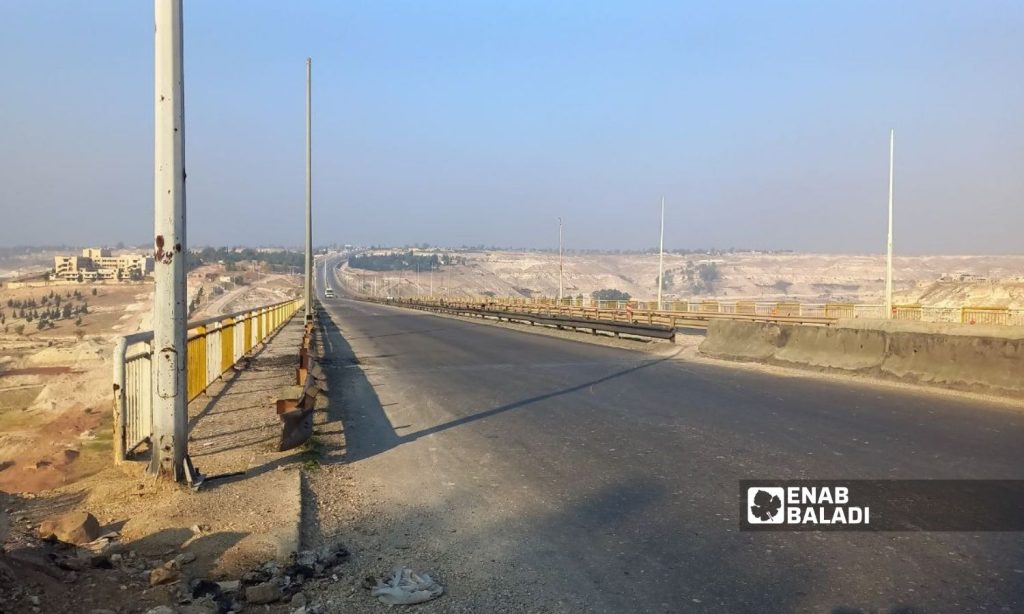Homs – Orwah al-Mundhir
Regime-held areas have been experiencing a stifling fuel crisis for about two weeks, which is considered the worst in terms of duration and timing. The issue of high prices is no longer the problem; most of the fuels are unavailable and at double prices when available.
The regime’s government justifies the current fuel crisis by the delay in the arrival of oil supplies. The Damascus-based al-Watan newspaper quoted the Minister of Oil in the regime’s government, Bassam Tohme, on 1 December, as saying that the delay in supplies “was unforeseen, which forced the government to take harsher measures to cover basic needs.”
Fuel prices rose to record numbers following the Minister of Oil’s statement and televised interview, which was broadcast on regime media outlets; one liter of gasoline cost about 20,000 SYP in Homs, while a liter of diesel reached 8000 SYP.
Meanwhile, a gas cylinder costs 350,000 SYP for the first time ever, after which it disappeared from the markets almost completely. The crisis is evolving from soaring prices to an acute fuel shortage in the market.
The fuel crisis has not only affected the transportation sector in Homs but has also impacted the governorate’s merchants in a multitude of sectors.
Transport paralysis
With soaring prices and shortages of fuel, transport traffic experienced near-total paralysis, limited to public transportation, which in turn suffered from a previous crisis, affecting commercial movement and leading to higher prices of other materials.
Mukhles, a taxi driver in Homs governorate, who refused to disclose his full name for security reasons, told Enab Baladi that the crisis forced him to suspend his work, which is the source of his family’s livelihood because the price of a liter of gasoline reached 14,000 SYP several days ago.
He added that the price hike coincided with the lack of passengers who could pay the fares; a ride that requires two liters of gasoline would cost the customer about 50,000 SYP.
He considered that resorting to selling his gasoline allocations is more feasible than searching for passengers who cannot pay the taxi fare.
With taxis out of service, pressure has increased on the public transportation sector, which is experiencing successive crises. The regime’s government changed the mechanism for granting fuel allocations from daily allocations to allocations per each trip, forcing drivers to queue at the diesel station in “garages” before each trip.
Ashraf, who reserved his full name for security reasons and who was working as a mini-bus driver between Homs and its countryside, told Enab Baladi that the regime’s government had halved the number of public transport buses. It also decided to grant fuel allocations per trip instead of the usual daily allocations to prevent mini-bus drivers from selling their allocations on the black market.
Maryam al-Sheikh, a university student at al-Baath University, told Enab Baladi that she is late every day for classes and upon returning home because the buses have to stop at the gas station every trip to be supplied with fuel allocations. “This forces us to wait in line at the stations for an hour and a half on each trip,” she says.
Cold storage owners and merchants are in trouble
Due to the near-complete shortage of fuel in the market, the facilities that were able to suspend their work stopped, while some facilities fell into a double crisis, such as refrigerated warehouses that depend on diesel fuel to run electricity generators.
Mahmoud, the owner of a refrigerated storage facility in Homs, who refused to reveal his full name for security reasons, told Enab Baladi that the shortage of diesel fuel in the markets has put his entire business in “real trouble,” as he owns goods of onions and potatoes worth hundreds of millions in warehouses that are threatened to be damaged if the outage lasted for more than five days.
Today, Mahmoud was forced to inform the owners of the goods that they must provide the refrigerated facility with diesel fuel to operate the generators or remove their goods before they were damaged.
Not a new crisis
The fuel crisis in Homs is not the first of its kind, having been repeated since the beginning of this year. Over different periods of time, gasoline prices have risen considerably while diesel is almost non-existent, in conjunction with lower temperatures.
The market relies on diesel smuggled from Deir Ezzor and the areas held by the Autonomous Administration of North and East Syria (AANES), which is administered by the Fourth Division forces levying royalties on car owners.
As for gasoline, it reaches the market through car owners, who have started selling their government-subsidized fuel allocations on the black market to reap profits. Another part of the gasoline is smuggled in from Lebanon under the supervision of the Lebanese Hezbollah.
Samir al-Droubi, a member of the Executive Office of the Supply and Internal Trade sector in Homs governorate, previously told the al-Watan local newspaper that “this diesel is not local and it is not provided by the General Fuel Distribution Company (SADCOP),” commenting on diesel being available on the black market while government stations are witnessing diesel shortages. He stressed that it is “illegal and most likely to be smuggled in from outside Syrian territory.”











